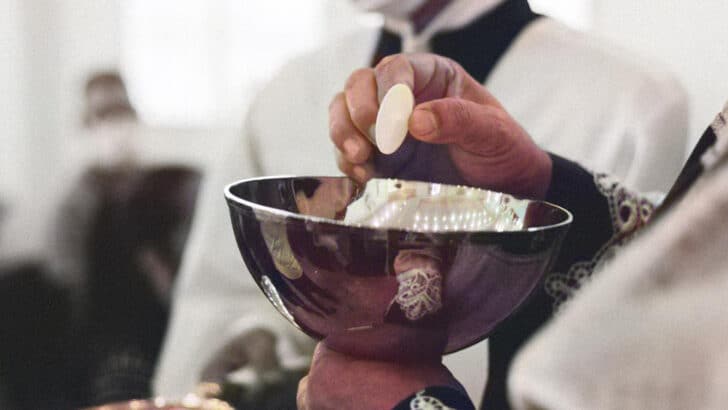Michael R. Heinlein
I’ve noticed a pattern lately. Whenever my 7-year-old son presents himself for Holy Communion to a minister unknown to him, he is routinely denied the sacrament. I find this fascinating.
He does all the right things. He bows. He makes the sign of the cross. He waits patiently to say “Amen” before opening his mouth to receive the Sacred Host. He looks up, bright-eyed, alert and focused on who he’s about to consume. But still he is denied.
I’ve found myself distracted by the whole episode far too much than it’s worth. My heart pours out for the little guy who clearly isn’t sure what the problem is and is probably developing a little bit of a complex about the whole situation.
The first time or two it happened, I thought maybe the problem was just his stature. I thought maybe he wasn’t showing the proper gestures, or didn’t seem focused or prepared. But as time has gone on, I’ve found myself thinking there might be something else going on, and I’ve been reflecting on what this by now all-too-familiar scene manifests about us and our pastoral practices.
Distribution
Over the years, I’ve witnessed, during the distribution of Communion, far too many occasions where members of the faithful have wandered off with a Host in their hands. I once saw a father break off a piece of the Eucharistic host and communicate his toddler. At the same time, we have public figures receiving Holy Communion week in and week out despite a perseverance in manifest, grave sin. With all this happening, why is it that kids are such a concern that we need a priest to pause the distribution of Holy Communion in his line just to end a standoff between an extraordinary minister and a young boy just wanting to receive Our Lord’s precious body in another?
Yes, the Holy Eucharist is a treasure beyond compare, deserving our safeguarding and protection. We should and must be vigilant to ensure the Eucharist is not abused or desecrated.
But Jesus also says “let the children come to me,” no? Why would a boy who makes all the right gestures ahead of receiving the Eucharist, with a vouching parent standing behind him – nodding a big ‘yes’ nod – not instinctively be given the benefit of the doubt? Does he pose the threat to Eucharistic sacrilege?
Do we come up with a universal gesture-like arms crossed around the chest – like my 5-year-old daughter does – to indicate a blessing?”
Because our family travels a good bit, I have discovered that the problem doesn’t centre around one parish or one diocese. Instead, it’s become clear to me that it’s something quite common. But where is it engrained? Is this part of the training given to those distributing Holy Communion? Or is it making manifest something that’s lacking?
I don’t have the answers. But I do have this humble column. So, take this as a cri de coeur for those distributing Holy Communion at Mass, one especially for extraordinary ministers of Holy Communion – and those who train them – who in my experience are more likely to say ‘no’ to my son.
Safeguard the Eucharist, yes. When in doubt, verify licit reception of the sacrament, of course. But please don’t stand there ignoring a little one who presents himself to receive Jesus. Please don’t try to propose a blessing if you are unsure why he isn’t moving. Perhaps ask kindly, “Do you receive the Eucharist?” if you aren’t sure. Do we come up with a universal gesture-like arms crossed around the chest – like my 5-year-old daughter does – to indicate a blessing? We’ve got to find a better solution than, amid uncertainty, turning away one of the little ones by default.
Inspires
But back to my son for a moment. In the face of these encounters, he inspires me. He stands his ground and doesn’t move. He doesn’t get bossy or demanding. He waits patiently and attentively. He takes it all in stride, showing a stiff upper lip. He laughs it off, meeting it with his characteristic happy-go-lucky attitude. “I just want to receive Jesus,” he says, when I praise his attitude.
I just pray our well-meaning Church doesn’t send him the wrong message. I pray we don’t somehow damage his spirit. As we continue down the road of Eucharistic Revival, might we also think of the little ones? Of those who we should be welcoming, encouraging and, yes, challenging? I can’t help but think that we’re taking a step backward in our efforts when a little guy is left standing bewildered at the altar rail.
Michael R. Heinlein is author of Glorifying Christ: The Life of Cardinal Francis E. George, OMI and a promised member of the Association of Pauline Cooperators.



